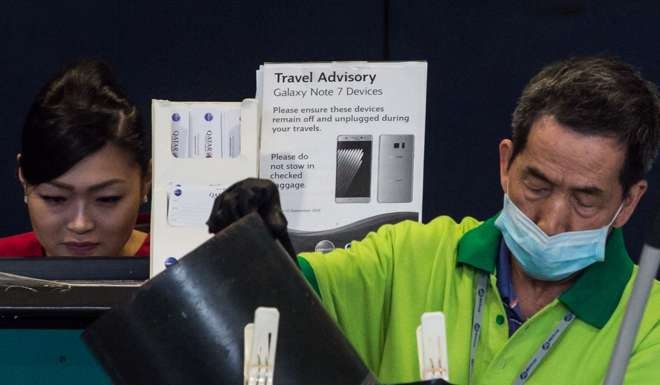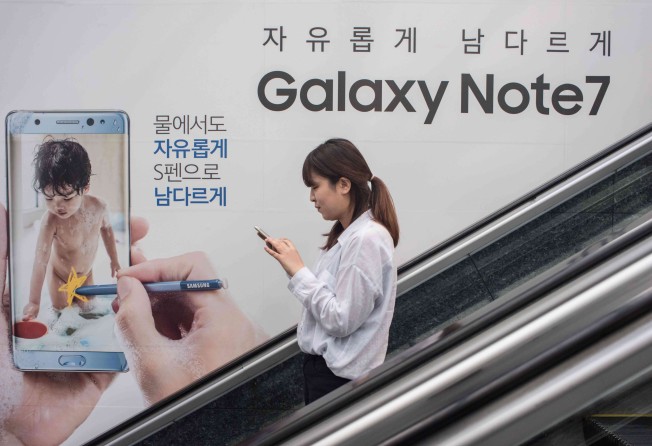
Samsung’s Galaxy Note 7 fires caused by battery design, manufacturing issues, says company

Samsung Electronics said the exploding incidents experienced by its Samsung Galaxy Note 7 device last year were caused by battery manufacturing and design issues. The South Korean electronics giant made the announcement on Monday after conducting an internal investigation and hiring independent consultancies to analyse the issue.
The issue with the battery in the first version of the Note 7 smartphone, manufactured by Samsung SDI, was due to a slight deflection in the negative electrode of the lithium ion battery, causing a short circuit when the negative electrode and positive electrodes met, said Samsung Mobile chief DJ Koh in a press conference in Seoul on Monday.
The second version of the battery, manufactured in China by Amperex Technology, had abnormal welding bumps left behind during the welding process on the positive electrode, causing a short circuit when the bumps on the positive electrode penetrated the separator and the insulating tape that kept the positive and negative electrodes separate. The company also said that a number of batteries were also missing insulation tape.
“We provided the target for the battery specifications for the innovative Note 7, and we are taking responsibility for our failure to ultimately identify and verify the issues arising out of battery design and manufacturing,” Samsung said in a statement.
The South Korean electronics giant engaged three independent experts, US-based consulting and certification company UL, US-based engineering and scientific consulting firm Exponent as well as German testing, inspection and certification firm TUV Rheinland to investigation the reasons for the device incidents.
The Galaxy Note 7 device was launched by Samsung last August, but was recalled in October after a host of exploding incidents in both its original and replacement devices. Various airlines have also banned the use of the Galaxy Note 7 on planes following the incidents.
Samsung initiated a recall of about 2.5 million devices worldwide, and said on Monday that over 96 per cent of the devices that have been sold and activated have been returned to the company.
“Samsung is committed to the highest quality and safety. We used the lessons from this investigation to improve upon our robust quality and assurance processes and establish comprehensive preventative measures,” said Koh.

Jin Di, research manager at IDC China, said Samsung is expected to have a tough year ahead regardless of the results of the investigation.
“Chinese home grown smartphone makers have already jumped to the top in the country. It is safe to say that Oppo, Vivo and Huawei’s top three positions in China’s market are already well established,” Jin said.
“Samsung, which lags behind Chinese rivals in both sales channels and marketing, will find it more and more difficult to boost its market share in China, where there is growing interest among consumers to buy smartphones from local brands,” she said.
Oppo and Vivo, two smartphone companies little-known outside of China, emerged last year as the dominant brands in China. Data from Counterpoint Technology Market Research showed that the two brands, both owned by Guangzhou-based BBK Electronics, captured a combined 33 per cent in market share in the third quarter of 2016.
They were followed by China’s Huawei and Xiaomi. Apple ranked fifth with 8.4 per cent market share in the third quarter, while Samsung trailed in sixth place. The South Korean brand saw its share of shipments in China drop from 8.6 per cent in the first quarter to 6.8 per cent in the third quarter.
James Yan, research director of Counterpoint Technology, said Samsung is expected to see fiercer competition in China as local brands gear up to launch more high-end smartphones to earn a better profit margin.
“From Huawei to Xiaomi, many Chinese players are launching smartphones priced at 4,000 yuan or more as they can barely make a profit in low-end phones due to rising production costs and intensified competition,” he said, adding that Samsung will feel the most pressure as Apple’s iOS operating system and its independent App Store ecosystem helps it avoid direct competition in the Android world.